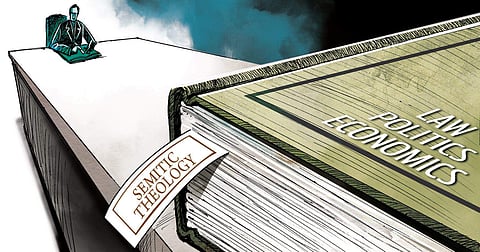

Words are the most important invention of mankind. While most words have a straightforward meaning, there are words which are shorthand for concepts. We use these important word-concepts often but very lightly. Word-concepts are derived from the underlying experience and beliefs of people. The Constitution makers were largely products of English education in India with some who had experience of higher education in Britain in politics, economics and law. The Constitution makers were remiss in not making clear what the important word-concepts in the Constitution actually meant. Some of the most important concepts introduced by the British rulers and adopted by our Constitution makers need to be analysed.
Take for example, “religion”—so closely safeguarded by the Constitution. What exactly does it mean? One possible meaning lies in the Semitic religions—Judaism, Christianity and Islam—based on their common idea of a single God who is the creator of all things and beings.
His true commandments must be obeyed by all believers, who have only one life, in order to achieve salvation on Judgment Day. The other possible meaning lies in Indic traditions accumulated over thousands of years and which are respected and followed as ancestral wisdom. In Indic traditions there is no single God, no single holy book and no truth claims. Indic traditions permit people to continue ancestral practices which have meaning in their lives and which bind them as a community and, after death, ensure rebirth on the basis of actions in the previous life.
Each Semitic religion believes only it is true and all other religions are false, while Indic traditions hold that no religion is false. Semitic religions—particularly Christianity and Islam—impose a duty on their followers to convert non-believers to their ‘true faith’ while Indic traditions do not. Indic religions require non-interference in their ancestral traditions and practices.
Thus, the use of the concept-word “religion” to encompass fundamentally different notions was to confuse and confound the Constitution makers and their inheritors. So when the Constitution makers permitted the freedom to “propagate religion” they were in fact privileging Christianity and Islam as opposed to Indic traditions (by not preventing interference in their traditional practices and beliefs by Christian and Islamic proselytisers). On this issue there is no way the state can be neutral and conflict is inevitable.
The second important concept in the Constitution is that of “equality”. This concept, derived from Semitic theology, is a powerful binding force. But it postulates equality before God between true believers and not between believers and non-believers. The Indic religions have no such notion and, in fact, postulate inequality as a consequence of the individual’s actions in the previous birth.
Based on Semitic theology, European political theory dictated that the state should treat all its citizens equally. The Constitution makers—products of European political indoctrination—established equality under law of citizens regardless of their religion, caste or gender. However, they were permitted by the state to treat substantial sections of the population more equally than others by providing for special reservations for some groups in employment and education.
Thus even the idea of equal rights and equality of opportunity was vitiated. In the Communist ideology, the notion of equality escalated to equality of outcomes. This meant each individual should have the same economic and social status and those more privileged were to be eliminated physically. This resulted in tens of millions of people being killed in Soviet Russia and Maoist China before the idea was abandoned in the late 1980s.
The third important word-concept is “secularism”. This is derived from the Protestant Christian Reformation (1515-1648) which postulated the theory that human life was divided into two spheres—that of the body, subject to the secular laws of the state and that of a soul, subject to God. As opposed to Judaism, Catholicism and Islam, Protestantism established that individuals had to obey the secular law of the land and the state had to permit them to seek their individual salvation through their religious practices. In India, the British Protestant state abolished the Sharia criminal code in the 1870s.
The remaining Sharia civil code could be subject to interference, reform and abolishment by the state just as Hindu civil code has been in post-Independent India. But fundamentally, the problem is technical: if “religion” can’t be defined, then religious practice cannot be distinguished from what is not religious. After 60 years of discussion and debate, even the Supreme Court has given up the idea of defining what “religion”, “religious”, “equality”, “secular” and “secularism” mean.
The loose usage of these three terms, “religion”, “equality” and “secularism”—part of the “basic structure” of the Constitution—indicate the difficulties in adopting word-concepts derived from Protestant Christian experience, now secularised and universalised. These metaphysical word-concepts, adopted by the English-speaking Constitution makers and inheritors, cannot be understood in Indic languages as they are outside the life experience of the Indic population.
Important word-concepts must be properly defined to find acceptance. This troubled Emperor Ashoka. In many of his inscriptions he referred to “dharma” and in one, says this: “Dharma is good, but what constitutes Dharma? (It includes) little evil, much good, kindness, generosity and truthfulness. ... Respect for mother and father is good, generosity to friends, acquaintances, relatives, Brahmans and ascetics is good, not killing living beings is good, moderation in spending and moderation in saving is good.” Dharma was derived from the experiential world of his people and seems even now—after over 2,200 years—enough to regulate a society and people. Society must be based on concepts based on the people’s life experience, not on undigested imported concepts like the Constitution makers and their inheritors imposed unthinkingly.